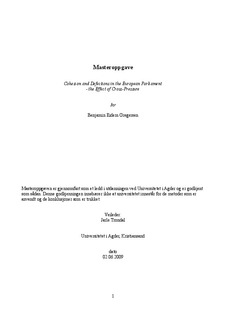| dc.description.abstract | The study on voting cohesion in the European Parliament seems to be heavily influenced by
scholars like Noury and Roland, that argues for a very high voting cohesion in the European
Parliament (e.g. Noury and Roland 2002). This view is balanced by those who argues that there is a
bias in the data that are being used to determine this high level of voting cohesion (e.g. Carruba and
Gabel 1999).
There are some that argues that the co-decision procedure leads to a higher interest by the national
parties on how their representatives in the European Parliament votes (e.g. Carruba and Gabel in
Scully 2001). The more power the European Parliament possess, the more incentives would both
the national party and the transnational party group have on the vote, which means that the part that
holds the most power over the Member of the European Parliament (MEP), will sway this voice in
their favour.
By studying four cases where the co-decision was used, I found that the defections from the party
group were generally high, but not conclusive, due to the limited amount of cases. In an effort to
compensate for the few cases I studied cases of investiture one procedure, a directive and two
regulations, which included both regulatory and distributive policy areas.
I used four variables which I hoped could explain the defections and remain consistent, which
included the Governmental status of the national party, the Electoral System, the Policy Area of the
Proposal and Political Role and Preferences. The existing literature combined with my results
suggests that there are a connection, but the problem with the data material however caused this
analysis to be incomplete and the results I found were ambiguous, largely due to this problem. The
data on the current members of the European Parliament does however seem to be more detailed
and an analysis of legislation from the 6th parliamentary term might be more conclusive.
If suggestions by Noury and Roland (2002) are introduced, regarding increased use of co-decision
and Roll Call Votes, combined with Hix and Hagemann's (2009) suggestions regarding
independence of the MEPs and “European Issues”, we might be able to analyse the votes without
bias and conclude with high voting cohesion. | en |
